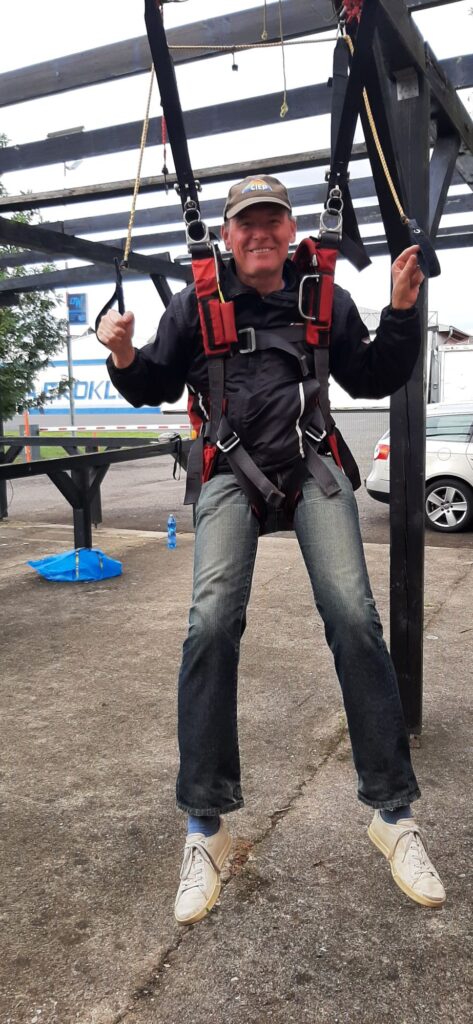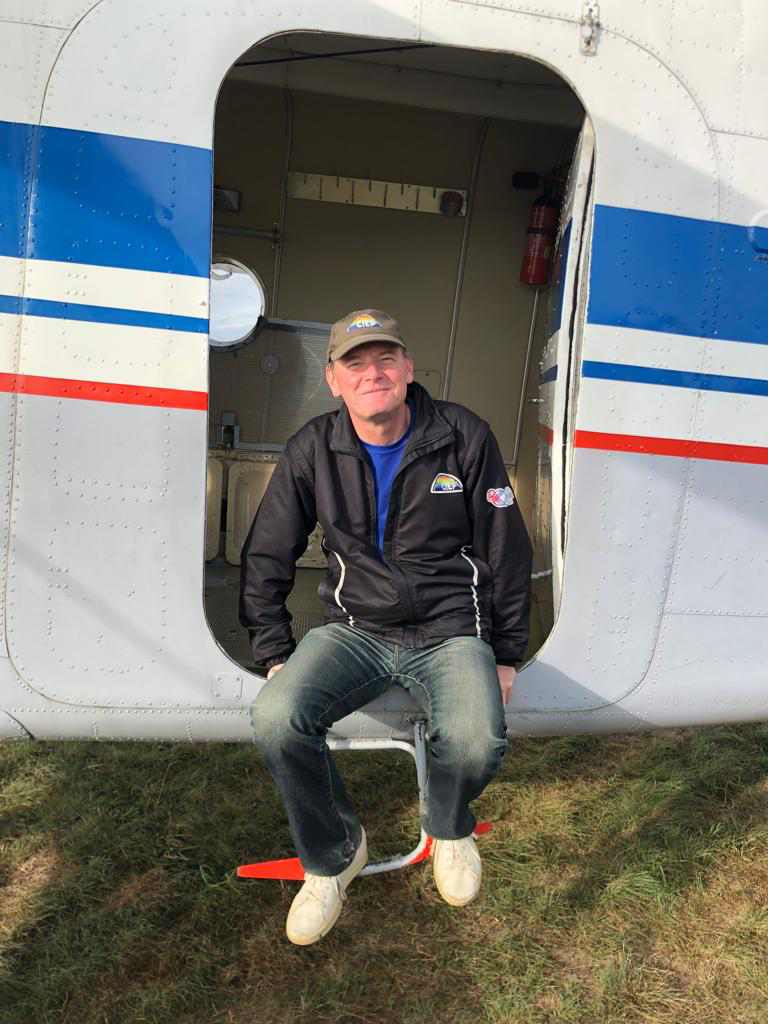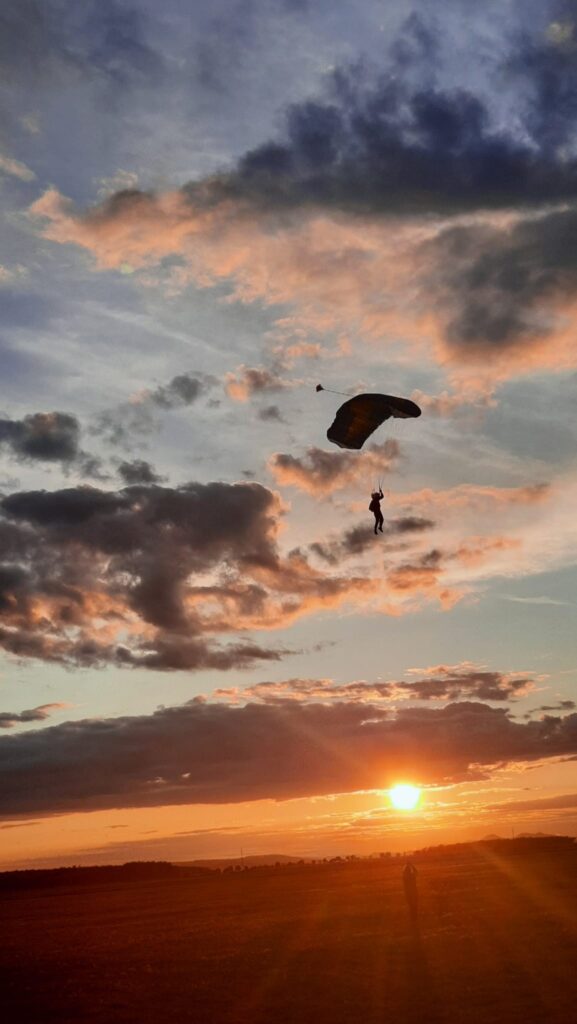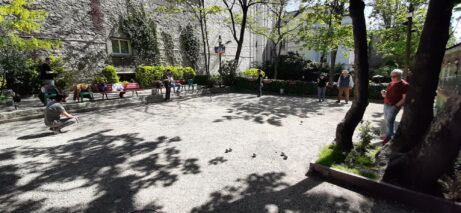„Will you jump?“
It’s the only question on my mind.
I’m standing at the open door of the plane, my right toes precisely at the edge of where metal meets sky. I feel three taps on my shoulder—the sign I can jump—but I’m not moving. Three more taps. The plane’s propellers are screaming at the top of their lungs. Three taps. Time is standing still. I’m frozen. Three taps. Will I jump?
NOW!!!
Evžen Křížek comes to my pétanque trainings. He enjoys the game, the camaraderie, and talking about his passion: skydiving. For a year, I resisted his stories about the wonders of skydiving, his beautiful photos from the air, and his tales about competitions—wins and losses, lessons learned. Once, Evžen even showed me in my garden how to pack a parachute, explaining which pull was good for what. Still, I resisted, until finally…
Zdeněk in Paraklub Říp is a pro.
Zdeněk is a great instructor who introduces me and two younger boys to everything we need for a successful first jump. We start with theory and follow with instructional videos. On the first day, Zdenek does most of the talking. Day Two, it’s up to us.
He hangs us in the training parachute and we repeat the basic instructions over and over again: Tighten the straps, hands on your stomach, feet together, jump, count 121 – 122 – 123 – 124 until the parachute opens. Check the canopy, ropes, slider, and handles. Then, because you have only about a quarter of an hour, look around! Take it all in before taking the control handles to prepare for your landing.

At the end of the second day, Zdenek asks us to return the next afternoon. We will take an exam and then we will board the airplane, the plane we will exit from 1200 meters above the Earth.
A grain of doubt pops into my mind and tries to settle there and grow: Will I be able to remember to do all we have just practiced on the ground calmly and properly, in the air? Should I just drive home this evening, and spend my weekend safe and sound, taking a walk through the park and playing pétanque?
But I push the shadow of doubt—and familiarity—away.
„Sure,“ I say. „I’ll be here tomorrow.“
If everything goes as expected, gliding through the air must be a one-of-a-kind feeling. But how will I cope if my canopy doesn’t fill with air or my ropes get tangled? What if another skydiver suddenly appears in front of me and I have to automatically pull on the right handle to avoid him? Or, what if I have to – ugh! – drop the main chute because of an unsolvable problem and pull the handle of the reserve chute in a flash?
The answers to these „but“ and „what if“ questions—like all other answers in life, can only be found and dealt with in the moment—the difference here, I’ll be in the air. I’m a man, not a bird, what am I thinking? But I’ve committed.
I show up on Saturday. I pass my exam. I’m committed.
I am standing at the open door of the plane. I feel the tap, tap, tapping. And then, I am counting 121 – 122 – 123 – 124… my body, weightless, is quickly moving down and away from the plane. Checking the parachute, everything is fine. I take the handles, pull to the right, pull to the left. I’m turning the way I’ve been taught to, the way I’m supposed to! The parachute is listening to me! Around me, other colored parachutes open up.
For fifteen minutes, through clear protective goggles, I hover and float, taking in blue sky and the green marble below. The landing is a little rougher than I imagined, but I survive it.
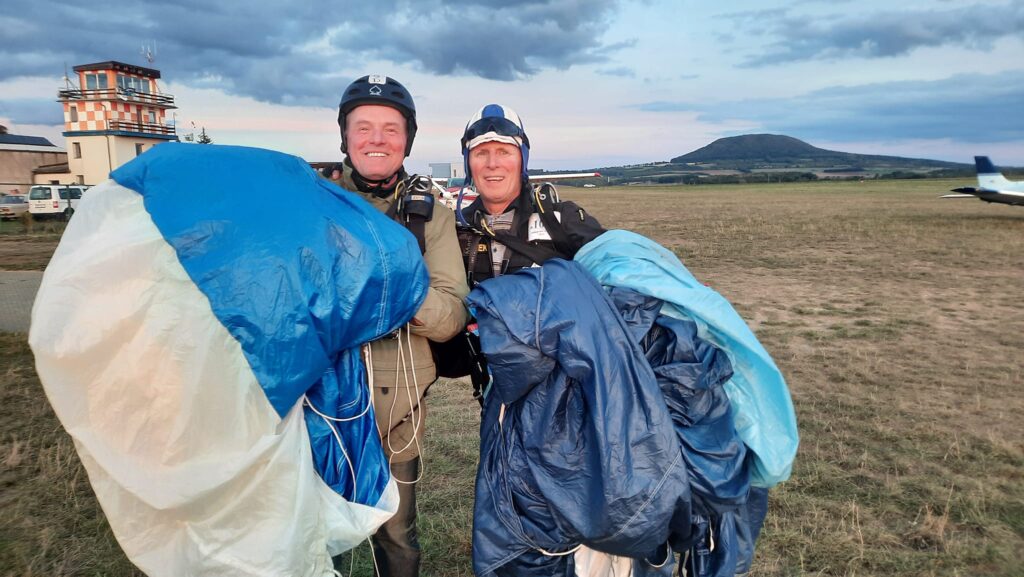
After a congratulatory slap on the back, my mind reverses for a split second: Did I have my hands placed correctly and my feet together when I jumped? Despite endless repetition and drills beforehand, I’ll tell the truth – I think not. But the excellent teaching at Roudnice Aeroclub held in my subconcious after all, because if I had taken the leap into thin air completely wrong, I would have been thrown off balance immediately, and I wasn‘t.
A sense of satisfaction sinks in alongside the weight of my body returning. I’m not euphoric; even in everyday life, I usually control my feelings. But pleasure and warmth spreads throughout my body and naturally, because most everything I do connects back to my love of pétanque and training others, I ask:
What did I take from skydiving, for life and for pétanque?
- Respect for the instructor/trainer. An experienced trainer knows which way to lead you and why. Sometimes a student or a player thinks they know better and doesn’t need to reevaluate or practice and repeat what they (think) they already know. A trainer gives, and a student does too, in an exchange of respect. I wouldn’t jump without mutual trust with Zdenek. And without mutual trust on a common path or goal, my charges become former charges. Naturally.
- Teamwork also applies in individual sport. Skydiving, you’re alone in the air with a parachute. In pétanque, you’re alone in the ring when you throw the ball. In both situations, you need to know that your teammates have created the necessary conditions for you to do what you need to do, so that you can do it well. You don’t know who packed your parachute and you have to be sure they did it perfectly, just like everyone else involved in the process. The actual jump or throw is then up to you.
- Everything is different from the outside. From where I always stood, Mount Říp was a massive imposing mountain. But from the air, it took me several minutes to realize that the little green island below me was the same geographic feature I had hiked so many times. Skydiving obviously flips your point of view, but in pétanque too, you need to be aware of multiple perspectives, and practice taking them. Players must constantly focus, visualize, watch the game, think ahead, and re-focus. I stress this to all my charges and know myself how difficult it is to do in tournaments. But we gain perspective through paying attention to to our boules and through repetition, gradual improvement, and breathing correctly. By remembering how quickly one boule can change the game, you can more calmly adapt and continue your game without confusion.
- Cross the line and experience the unknown. The line between success and failure is often very narrow. On an airplane, it’s represented by the edge of the open door. Will you jump and overcome fear and doubt, or give up at the crucial moment and return to the tarmac still on the plane? Set ambitious goals in pétanque and in life and learn everything you need to learn to achieve them. And then have the courage to take that first step—big or small. Even if you don’t know what’s around the corner. Even if you don’t yet know what it feels like when the wind blows you away and you’re in a space where you are still learning to explore.
I thank Evžen Křížek for bringing this wild, yet controlled experience into my life. He is 72 years old, but with courage and enthusiasm, he puts many who are not even half his age in his pocket. I thank Zdeněk Karhan, his friend and instructor, who with professionalism and a contagious, fervent attitude toward human flight gave me the peace of mind I needed to get on the plane and then safely back on the ground.
Petr „Pierre“ Fuksa
International Trainer and Promoter of Pétanque
Author of Online School of Pétanque
E-mail: fuksa@petanque-pro-vas.com
